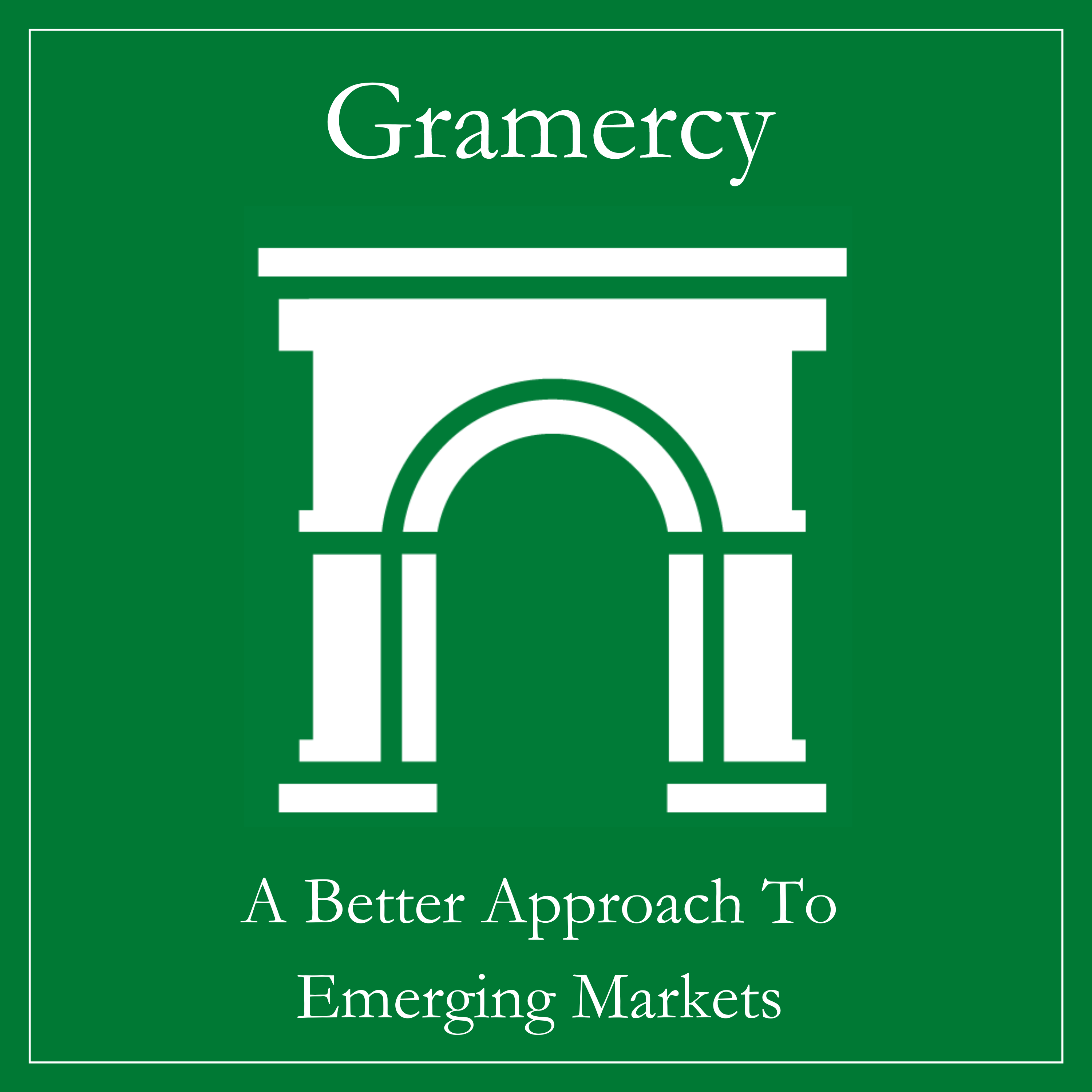Contents
Market Overview
Macro Review
Geopolitical tensions repriced crude oil. In fact, Brent crude oil had its best two-day streak of 2024 and was up almost 9% last week. We haven’t seen a $5/bbl intraday move in Brent crude oil in over 18-months. The week closed out with oil above $78/bbl. Geo-politically, the direction of travel is extremely concerning and has become increasingly unpredictable. This did not truly transcend across global markets last week, although some early signs of contagion were growing. After the Federal Reserve cut policy rates by 50bps, the debate shifted to November. Chair Powell said in September that the Fed was not guiding at a “new pace”. This week, the “new pace” of 50bps was initially debated, but then came a strong ADP, strong ISM Service data at a 19-month high and NFP that was almost red hot. To Powell’s credit, he remarked on Monday that “this is not a committee that feels like it’s in a hurry to cut rates quickly” and he covered himself well given the strong data. Instead, the volatility in financial markets was triggered out of Asia. At the G10 level, Shigeru Ishiba’s won the Liberal Democratic Party’s leadership race on Friday in Japan and the hawkish policymaker guided toward a possible December hike. However, the more sizeable volatility was in Chinese equities, and specifically property developers. We are at an exciting inflection point and see significant market demand for Chinese High Yield Property bonds.
EM Credit Update
Emerging market sovereign credit (cash bonds) ended the week unchanged with credit spreads 10bps tighter. Sovereign outperformers were Sri Lanka, Ghana and Mongolia, while Ethiopia, Kenya and Tunisia underperformed. Lebanon traded higher on the basis of international support, reconstruction efforts and possible IMF engagement. Meanwhile, Israel was downgraded to Baa1 by Moody’s, losing its Single A rating. Elsewhere, some progress is being made on Ethiopia’s restructuring of the 2024 notes.
The Week Ahead
With the NFP out of the way, the U.S. CPI reading is the last major data point ahead of the November FOMC. The debate for a 50bps cut is now extremely challenging for an institution that reminds us that they are data dependent. It is also the final CPI inflation reading before the U.S. election. Minutes from the previous FOMC are equally an important event. Other headlines may emerge with 3Q earnings season beginning for U.S. banks (JPM and Wells Fargo). Key EM interest rate decisions are due from India (6.50%), Israel (4.50%) and Peru (5.25%). While we have some time before the next Brazilian interest rate decision, the inflation trajectory is under scrutiny with the data being released next week. By Tuesday, Chinese markets will reopen after the Golden Week break. The focus will be on travel and spending data, after a more complete digestion of the stimulus measures. Finally, we will keep one-eye open ahead of Tunisian Presidential Elections and Melania Trump’s memoir.
Highlights from emerging markets discussed below: Brazil on the verge of regaining investment grade (IG) from Moody’s and higher than expected inflation for September could delay Türkiye’s rate cuts to 1Q25.
Fixed Income
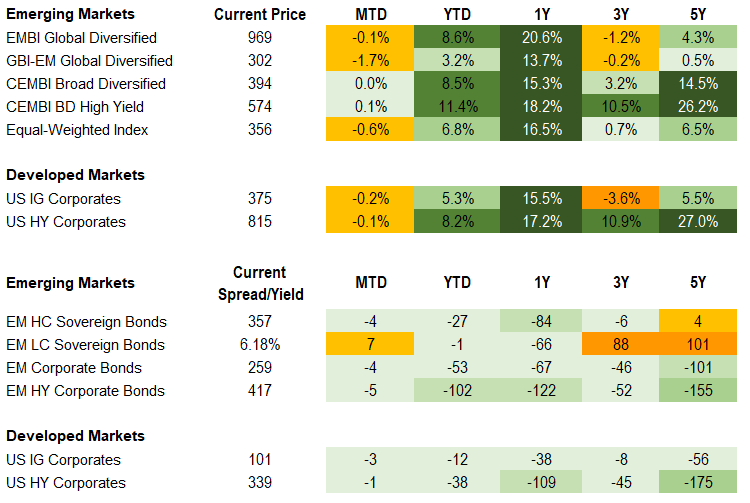
Equities
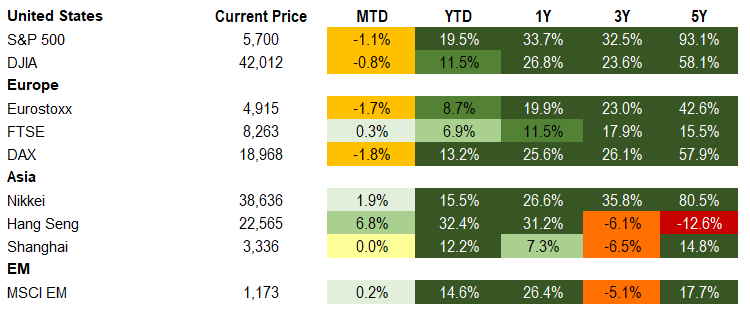
Commodities

Source for data tables: Bloomberg, JPMorgan, Gramercy. EM Fixed Income is represented by the following JPMorgan Indicies: EMBI Global, GBI-EM Global Diversified, CEMBI Broad Diversified and CEMBI Broad High Yield. DM Fixed Income is represented by the JPMorgan JULI Total Return Index and Domestic High Yield Index. Fixed Income, Equity and Commodity data is as of October 4, 2024 (early-morning).
Emerging Markets Weekly Highlights
Brazil on the verge of regaining investment grade (IG) from Moody’s
Event: Moody’s upgraded Brazil’s sovereign credit rating to Ba1 from Ba2, maintaining its Positive Outlook designation.
Gramercy Commentary: Moody’s rating action this week brings the sovereign just one notch below investment grade (i.e., Baa3 and above in the case of Moody’s). The retained Positive Outlook means that under normal circumstances, Brazil could regain the coveted IG status from Moody’s within the next 12 to 18 months, after having lost if from all three major rating agencies in 2015-16. All else being equal, a return to IG after a 10-year long hiatus as high-yield (HY) is likely to drive inflows toward Brazilian assets from a technical perspective. At the fundamental level, Moody’s highlighted that the decision to upgrade the sovereign reflects material credit improvements that are expected to continue, including a more robust growth performance than previously anticipated and a growing track record of economic and fiscal reforms that lend resilience to the credit profile. The agency added that Brazil’s rating would be upgraded further if the government proves successful in delivering steady improvement in the primary balance and overall fiscal deficits, which would enhance fiscal policy credibility. We note that improvement in the fiscal trajectory is the key factor for market participants, especially local investors. We expect constructive signaling by the authorities in 4Q and into the new year regarding the path of fiscal policy in 2025 to drive stronger market sentiment.
Higher than expected inflation for September could delay Türkiye’s rate cuts to 1Q25
Event: Türkiye’s September inflation print came hotter than expected: 49.4% year-on-year (YoY) vs 48.3% consensus expectation and 2.97% month-on-month (MoM) vs 2.2% consensus expectation. The annual print slowed down from 51.97% in August, but the monthly one accelerated from 2.5% in the prior month.
Gramercy Commentary: Higher than expected inflation numbers for September and the acceleration in MoM price dynamics indicate that inflationary momentum in the Turkish economy has not been completely defeated yet. The main contributor to the surprise uptick were “education prices” that rose more than 14% MoM, along with other services sector items that registered smaller increase. Although not marking a structural negative shift in inflation dynamics, the September data will likely compel the Central Bank (CBT) to stay patient for longer and wait to initiate a rate-cutting cycle in November or December as some market participants had anticipated. We believe that the authorities’ top priority remains ensuring a reliable disinflation path into year-end and for 2025 and that they would be careful to avoid a costly policy mistake by starting to cut rates prematurely. Importantly, we continue to have high conviction that political support for Minister of Finance Simsek and Governor Karahan’s disinflation program remains strong and should not be questioned by market participants. In that context, we continue to anticipate tailwinds for Turkish assets, especially for those denominated by local-currency, as we move into 2025.
Emerging Markets Technicals
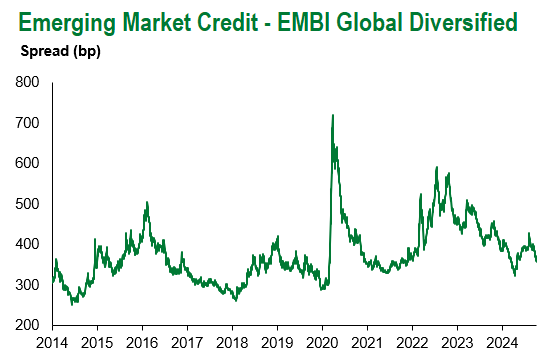
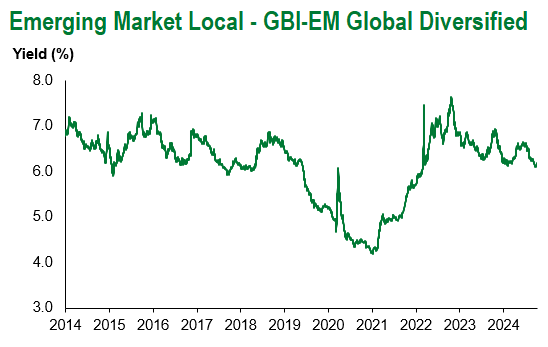
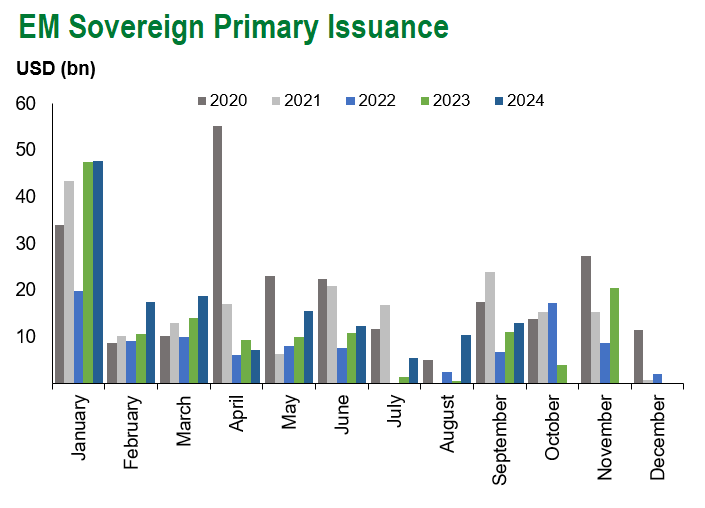
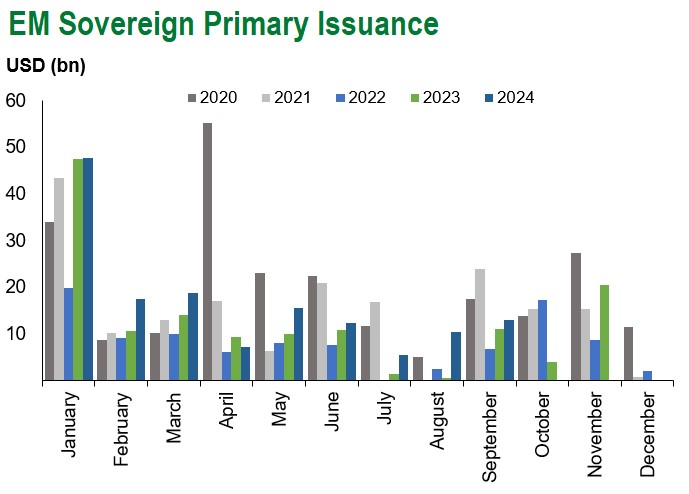
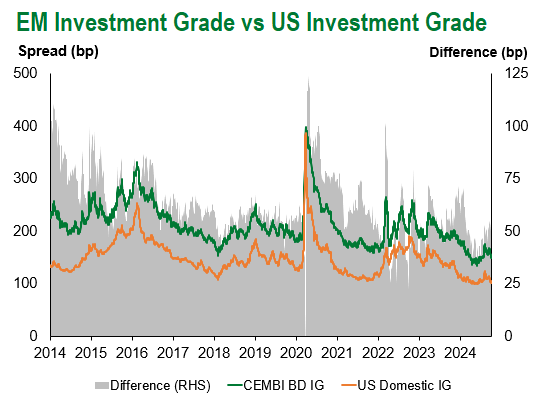
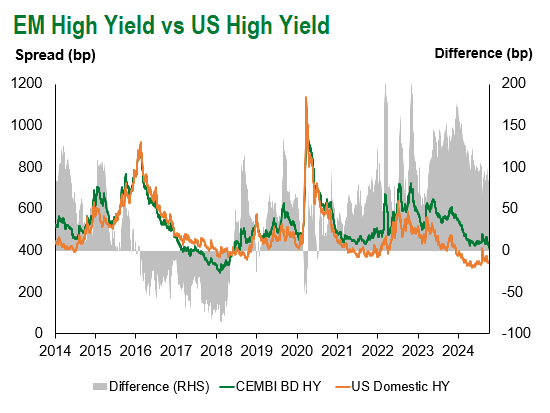
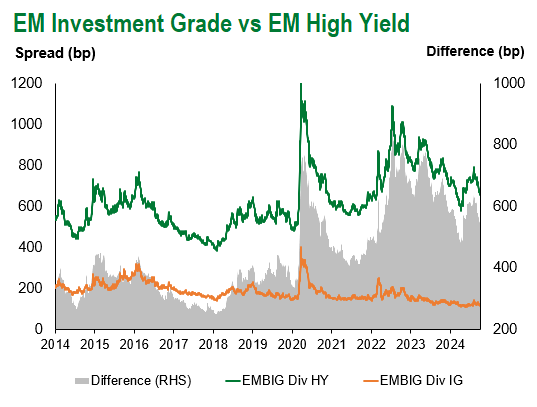

Emerging Markets Flows
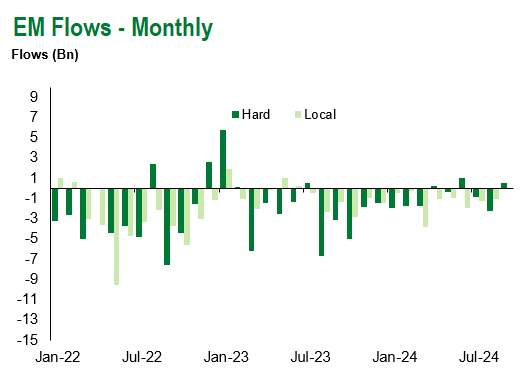
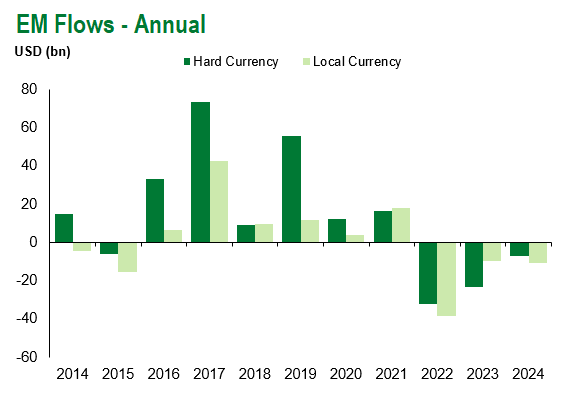
Source for graphs: Bloomberg, JPMorgan, Gramercy. As of October 4, 2024.
For questions, please contact:
Kathryn Exum, CFA ESG, Director, Co-Head of Sovereign Research, [email protected]
Petar Atanasov, Director, Co-Head of Sovereign Research, [email protected]
James Barry, Director, Deputy Portfolio Manager, [email protected]
This document is for informational purposes only. The information presented is not intended to be relied upon as a forecast, research or investment advice, and is not a recommendation, offer or solicitation to buy or sell any securities or to adopt any investment strategy. Gramercy may have current investment positions in the securities or sovereigns mentioned above. The information and opinions contained in this paper are as of the date of initial publication, derived from proprietary and nonproprietary sources deemed by Gramercy to be reliable, are not necessarily all-inclusive and are not guaranteed as to accuracy. This paper may contain “forward-looking” information that is not purely historical in nature. Such information may include, among other things, projections and forecasts. There is no guarantee that any forecasts made will come to pass. Reliance upon information in this paper is at the sole discretion of the reader. You should not rely on this presentation as the basis upon which to make an investment decision. Investment involves risk. There can be no assurance that investment objectives will be achieved. Investors must be prepared to bear the risk of a total loss of their investment. These risks are often heightened for investments in emerging/developing markets or smaller capital markets. International investing involves risks, including risks related to foreign currency, limited liquidity, less government regulation, and the possibility of substantial volatility due to adverse political, economic or other developments. References to any indices are for informational and general comparative purposes only. The performance data of various indices mentioned in this update are updated and released on a periodic basis before finalization. The performance data of various indices presented herein was current as of the date of the presentation. Please refer to data returns of the separate indices if you desire additional or updated information. Indices are unmanaged, and their performance results do not reflect the impact of fees, expenses, or taxes that may be incurred through an investment with Gramercy. Returns for indices assume dividend reinvestment. An investment cannot be made directly in an index. Accordingly, comparing results shown to those of such indices may be of limited use. The information provided herein is neither tax nor legal advice. Investors should speak to their tax professional for specific information regarding their tax situation.
